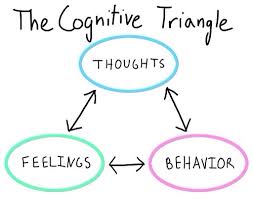What Does it Mean to be 'Full From Within'

To be truly full from within means that our “tank” is mentally full. In other words, our self, although beaten up, bruised, and broken sometimes as a result of our journey down each of our unique life’s path - is repaired and felt as whole again. Like a patchwork quilt that only gets stronger as a result of its many tears and reparations.
How does one achieve this, you ask?
Borrowing from Aaron Beck’s cognitive triangle - we have three components of the mind that work to repair the self: THOUGHTS, FEELINGS, BEHAVIORS.

These are the different components that must be running on all four cylinders to ensure that we aren’t at risk of developing or perpetuating an unhealthy relationship with any of the topics mentioned above, for the purposes of this article, specifically - food.
Thoughts To Repair The Self
Mindfulness Based Cognitive Therapy is a 25 cent term to describe the process of looking at the old tapes we run in our minds day in and day out for years upon years, and stopping them in their tracks, and replacing them with new ones.
A hallmark approach in Byron Katie’s book “Loving What Is,” is to continuously challenge one’s thoughts by asking “is that really true?” 13 If we deem that we can’t say with absolute certainty that a thought is true, then we can replace it with a more constructive thought.
For instance, if we find ourselves with a running narrative that goes something like “you are just never going to be someone that stands out, it’s ok you have other good traits,” then what is the behavior and feelings that it produces? Perhaps the person goes on feeling invisible like many people who are overweight feel. Maybe the person gives up on trying to stand out in the way they look and participate in life.
Feelings To Repair The Self
For my clients suffering from depression, I will often assign them a task of doing one social event, one bout of exercise (if they have never been inclined to exercise), and one learning activity (lecture, take a CE, attend a webinar, go to a pottery class, painting class, attend a speaking event).
Many of them balk at the idea. Some of them have been doing things their way for years and there is an undercurrent of fear related to breaking their routine. It is almost as if the depression has a voice that says “don’t do it, you will only feel worse.”
I’m reminded of the saying “if you keep doing what you’ve always done, you’ll keep getting what you’ve always got.” Nothing could be more true when it comes to depression.
We must realize that when we have depression, our mind is sick. It is no longer serving us, and the messages are coming from crossed wires. In order to uncross those wires, we must physically and literally put one foot in front of the other and re-engage in those activities that we know from the research lead to a sense of happiness or at least contentment.
Behaviors To Repair The Self
One of the biggest misconceptions about our mind is the idea that we must feel a certain way to engage in certain behaviors. In other words, we must first feel happy if we are going to go to a social event and relate to others in a positive way. However, the cognitive triangle mentioned above is tri-directional14, meaning our behaviors can influence our feelings and/or thoughts, and vice versa.
This is powerful information. This means that we don’t have to wait for happiness or joy to come around to engage in behaviors we know lead to more happiness. In fact, one of my first interventions with my patients who suffer from depression is the “just do it” approach, meaning they are given the task of doing three behaviors they don’t necessarily feel like doing in the six days in between their next therapy session.
To explain depression via a very simple analogy- it is like the flu for the mind. What do you typically do when you have the flu?
You cancel your appointments, stay in bed, drink lots of water, and get lots of rest. The reasoning is that if we minimize the number of life events for a brief bit of time, we will heal more quickly, and we do. BUT, this is not the case with depression.
The same intuition we use to combat the flu is the antithesis of what we must do to combat depression, yet somehow our instincts tell us to do the opposite. When we feel depressed, our inclination is to isolate, do less, and wait for the clouds to part. The problem with this is that this type of behavior is what feeds the depression.
Suggested Behaviors
Benevolence - reaching out to others and getting out of our own head, focusing on how to make someone else’s life or day better through connecting or giving.
Play- engaging in something that requires enough effort that we can’t run old unhelpful tapes (I’m not good enough, other people must be more disciplined than me, things will never change, etc), but provides us with enough fun that we leave the activity feeling light, like surfing, artistry, building, writing, playing an instrument, etc.
When we are kids, we spend about 95% of our day playing and even trying to find play in our responsibilities (have you ever watched a kid brush their teeth or get dressed? it is never a straightforward buttoned up process). Yet, as adults - we flip that on its head and spend 95% of our time being a human doing vs. a human being.
Learning- engaging in novelty is something our brain requires to feel happy and fed. It could be as simple as learning a new card game, all the way to enrolling in an MBA course. When we allow our minds to do what they are best at - our minds give back to us.
Connection- We are social creatures by nature. There is a physiological rewiring process that occurs as result of being in near proximity to other humans. It is how we survived so long ago, and our minds still provide the payoff.
We are not meant to live in isolation, yet so many of us drift in this direction when they are depressed. Even introverts require some social connection. While extroverts tend to thrive and recharge their batteries on social connection, it is true that introverts recharge in their solitude.
However, there is a difference between being alone vs. lonely. As introverted as you may think you are, none of us are immune to going from alone to lonely if we don’t make time for some social connection.
Exercise- There are about 99 reasons to exercise and happiness is one. I’m not going to waste space and wax poetic about the many benefits of exercise because I’m sure you’re well aware. But in addition to producing endorphins that have been proven to make us feel better, as far as weight loss goes- it also makes us less likely to put junk in our bodies. Ever do an intense sweat session and then make a beeline to the nearest McDonald’s? I didn’t think so.


